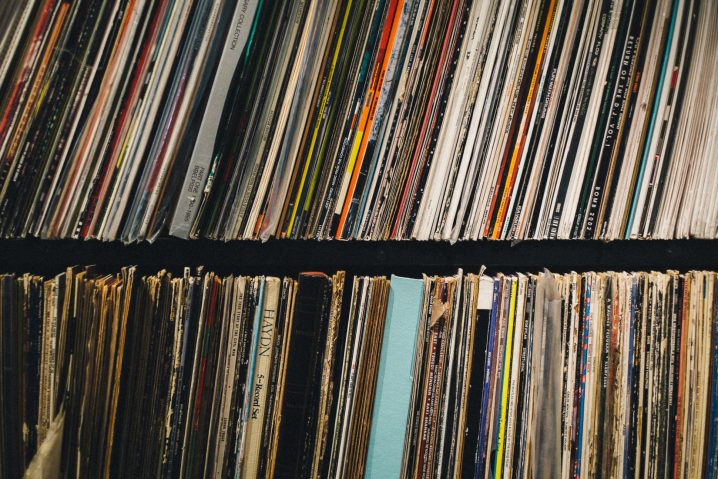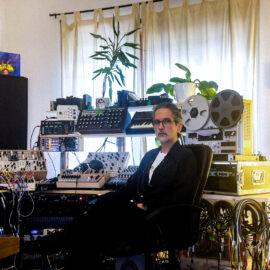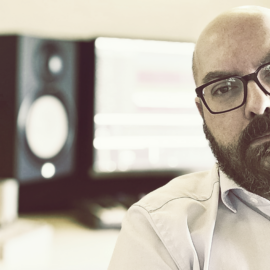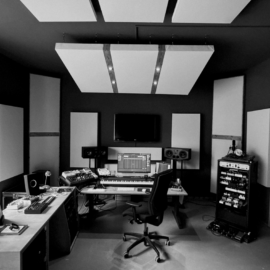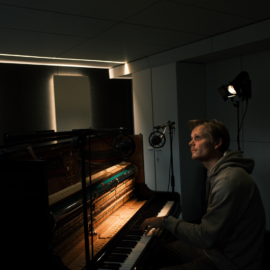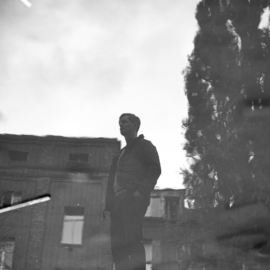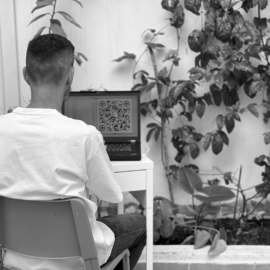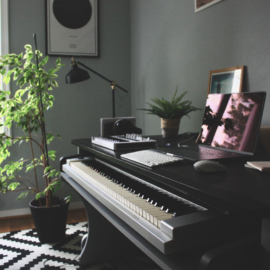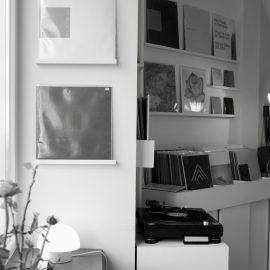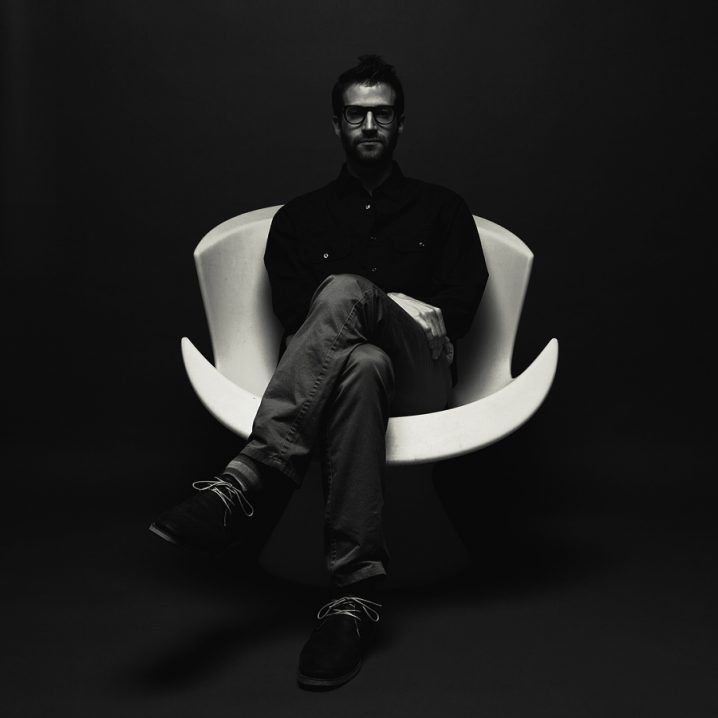
You can listen to something a million times by yourself but the second you’re sharing it with someone else you hear things in a new way…
I’ve been a fan of Benjamin Wynn’s music ever since his very first release, Pushing Air, on Neo Ouija in 2003. Back then I was mesmerized by the deep bass dropping glitchy IDM beats (well, I still am), and Deru was always in my rotations along with the entire Merck catalog, which I celebrate till this day. Besides being an electronic musician, Wynn co-owns a Los Angeles based sound design company, The Track Team, where along with Jeremy Zuckerman, the two have composed music for Nickelodeon’s televisions shows, including Kung Fu Panda: Legends of Awesomeness, for which they won a 2012 Emmy Award. These days Wynn still produces as Deru, with his last album, 1979, released by Friends Of Friends in 2014 ending up on Headphone Commute’s Best of the Year lists.
Lets start at the very beginning. Can you tell us how you got involved in composing, and what was your very first piece of gear?
I started making music in high school. I played trumpet and piano in grade school but never got very passionate about them. It was when I got into hip-hop around age 13 that I became obsessed with music. When I was a freshman I bought a crappy pair of Gemini belt-drive turntables and a mixer off of a friend, which I quickly outgrew and replaced with two Technics and a Rane. Then I got an Akai MPC2000 around my junior year or something, which could be considered my first piece of “gear” I suppose. A year or two after that I got an early version of Cubase and started making music with my computer… The rest is history I guess.
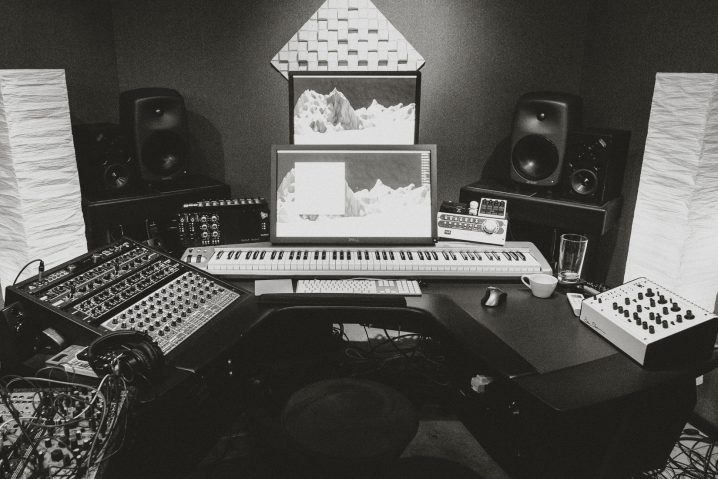
How many different studio iterations have you gone through, and what does your final setup look like right now?
There’s never really a “final” studio setup, as it’s always changing, but I haven’t had that many different locations in the grand scheme of things. I’ve been in my current spot for around a decade now, which is in a detached room in my house. It’s the first time I’ve ever had a soundproofed studio and it makes a huge difference. I can make all kinds of noise at any hour, and conversely I can block out any street noise. I love my studio. I spend my life there basically.
Tell us about your favorite piece of hardware.
Other than my computer it would be the Cwejman S1MkII analog synth. It sounds incredible. It can be precise but also fat and warm, and it always seems to fit in mixes without much effort. I’d trade my whole modular for it if I had to, because while I love the unexpected sounds that can come out of the modular, I love getting quick results more. The way the Cwejman is set up (it’s a semi-modular that’s pre-patched into a standard signal flow) it’s immediate in a way that the modular can never be, and lots of times I just want a nice analog bass or something simple.
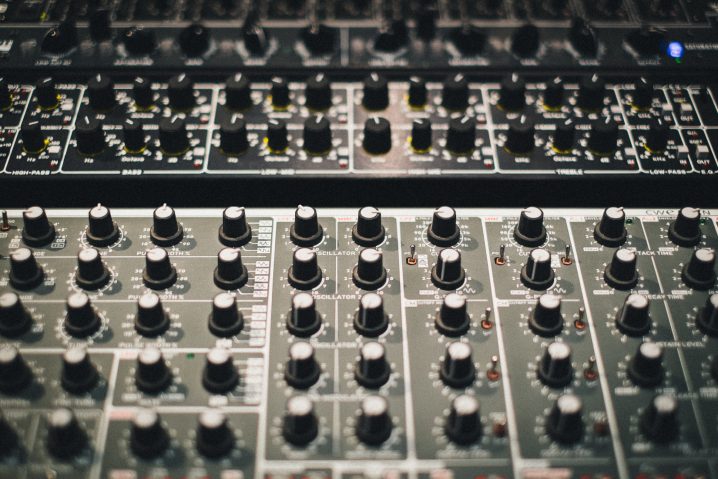
And what about the software that you use for production?
My main sequencer is Nuendo. I find it to be really flexible and customizable. But I’m kind of a software whore. I’m always trying out new things. I use all the standard plugins, as well as Max/MSP, Reaktor, Live, Logic, Soundhack, CDP, etc.
Is there a particular piece of gear that you’re just dying to get your hands on and do you think one day you’ll have it?
I’d like a polyphonic analog. A poly Oberheim SEM would be amazing. Tom Oberheim has been teasing rereleasing a new version of the 4 voice, which would be insane. If he actually does it I think it’ll be hard for me to resist (though I have no room for it). The new Prophet 6 looks tempting as well, though I’d like to hear it in person. All that being said I recently bought Diva from U-He (which has been out forever btw) and damn it sounds good. It’s mitigating a my lust for an actual poly for the moment at least.
I’d also love an acoustic MIDI piano, like a Disklavier or a retrofitted PianoDisc system. I’ve been meaning to do this for years, and I will eventually. Buying a piano is a ton of research though, driving out to play them, phone calls to set things up, finding a tech, etc. It’s daunting but I’ll do it one of these days for sure.
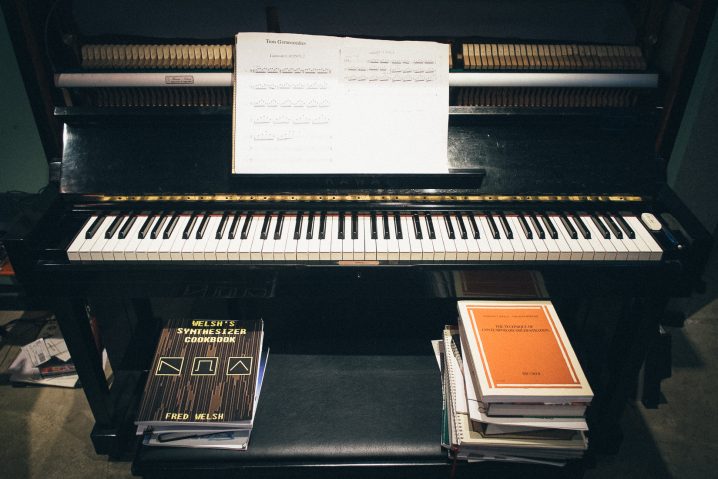
Can you please share some aspects of sound design in your work?
I view sound design and my music as two parts to the same thing. Most of what I do involves designing sounds in some way or another. I love texture. I love noise. So I often enhance or add noise and grit to sounds. I like things to breath and sound organic.
Any particular new techniques that you tried out for your last album?
Tapes! I bounced every song from “1979” straight onto an old Marantz tape recorder. It has a pitch warble that it imparts on everything but it sounds great if that’s what you’re going for. I also did the old studio trick of recording the songs with Dolby turned on and then turning it off during playback. It brings up the highs in a great, hyper compressed way.
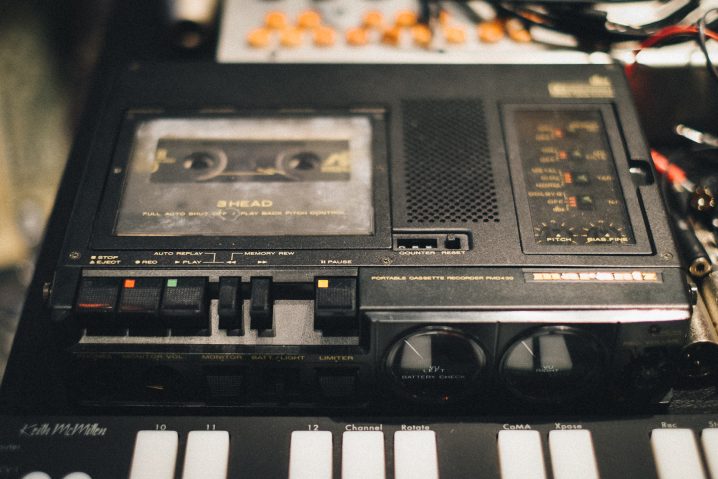
I’m getting into mixes with character. Distortion, saturation, noise. The things that make a recording sound alive vs the ones that make it ‘correct’ are often not the same thing so I’m staring to take more risks with my mixes. Taking the 2-track and doing some crazy shit to it is probably not something I would’ve done 5 years ago.
What does your live setup look like, and what do you bring with you when you travel for an extensive tour?
My live setup for “1979” is quite a bit different and more involved than for my beat sets. For “1979” I bring a laptop, modular synth, the Akai APC40 mkII, and an iPad running Lemur.
In my modular case I’ve got a granular sampler, digital oscillator, and an analog radio all running through a delay, looper, and reverb by Make Noise. The Erbe Verb is the last module in the chain and it’s been really incredible to use live. It’s a reverb that you can really tweak out and play in real time. I use the modular for a series of interludes in the show, which are improvised using the effects chain for dynamics and transitions.
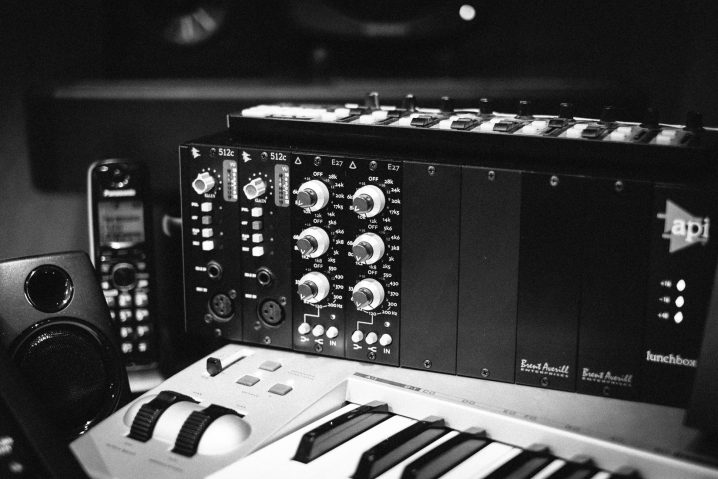
The “1979” show is also synced up to a pretty elaborate visual setup from EFFIXX, whom I travel with for it. We project onto a large scrim which we’re behind, and a circular surface that we’re in front of. EFFIXX also controls a series of LED lights that get activated in various ways throughout the show.
My beat set is more paired down, consisting of my laptop and the APC40 mkII. I love the Akai, as I’ve gotten to know it really well. My beat set is based around playing loops and effects, and it’s great now because I rarely need to look at my screen.
What is the most important environmental aspect of your current workspace and what would be a particular element that you would improve on?
I think the soundproofing is probably the most important aspect to my studio. It’s invaluable. There’s no need for me to worry about what I’m doing or my neighbors.
I do wish my studio was a bit bigger, and I’d love some windows that opened. A nice breeze in there would be great sometimes. I can definitely feel the hermit vibes from time to time, but I’m so blessed to have it in the first place so who cares.
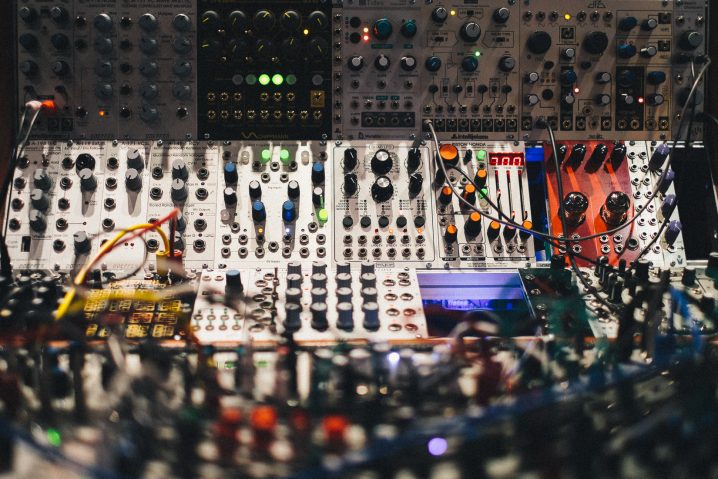
What can you tell us about your overall process of composition? How are the ideas born, where do they mature, and when do they finally see the light?
This is a broad question, as ideas can come from so many different places, but generally for me they start with experimentation around production techniques. That experimentation often leads me to figuring out where the sounds or song want to go on their own. I tend to be an intuitive composer versus a conceptual one, at least at the start of process. So while I tend to have some idea of how I want the final song to sound, the concepts for pieces often come to me while working.
I’m not the kind of person that is constantly working on tracks. I’m always tinkering with sounds, synths, and processes, but I often don’t apply them until I feel like I have enough of these ideas laying around in my head to form something bigger. And I tend to write albums, not songs if that makes sense. I start albums when I feel like I have something new to say and it’s ready to be said.
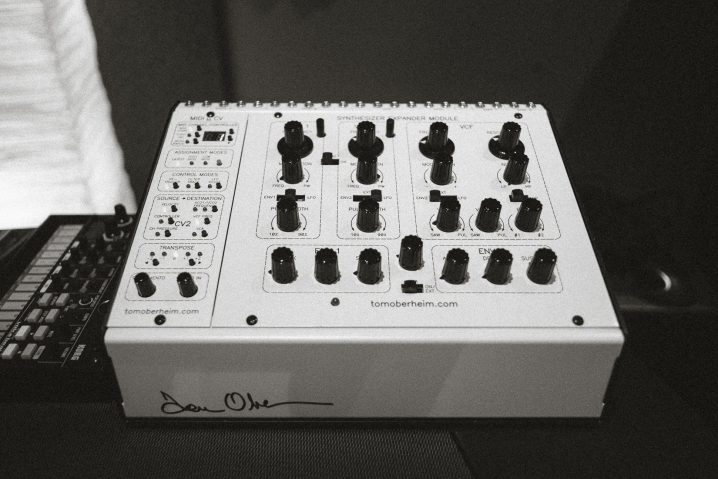
After the piece is complete, how do you audition the results? What are you reactions to hearing your music in a different context, setting, or a sound system?
Playing a song for a friend while sitting in the room next to them is huge. It instantly makes me hear it in a different way. I studied for a bit with Morton Subotnick when I was at CalArts and he told me he used to ask strangers off the street in New York to come up to his studio to listen to whatever he was working on. He’d ask them to not speak a word, to just to sit there and listen, and then leave. He said that simply having someone sit there makes you hear your music through their ears, and I find it to be totally true. You can listen to something a million times by yourself but the second you’re sharing it with someone else you hear things in a new way.
In terms of when I think something is done it’s generally an intuitive decision. It’s when I feel like I’ve improved it as much as I can, and tinkering with it anymore might make it worse. At some point the law of diminishing returns kicks in and I’d be better off applying whatever I learned to the next song. For “1979” for instance, many of those songs came to me in the matter of hours, and often when I tried going back to them I’d find that I only made them worse. There’s a delicate line between finessing something and not losing the essence of whatever was there originally… The magic if you will.
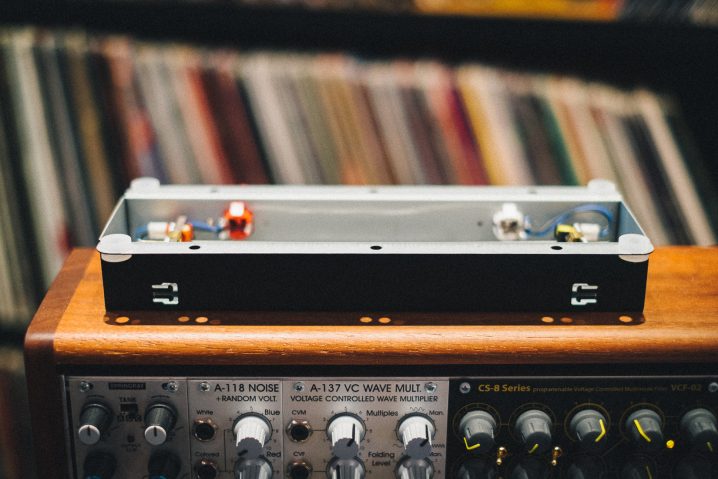
Do you ever procrastinate? If so, what do you usually find yourself doing during those times?
Oh hell yes. I’m a professional. But it depends on what I’m doing. If I’m working on scoring or sound design projects I tend to procrastinate more than Deru projects. My recipe is: 1) Make a cappuccino, or go drive to get one. This is crucial. It’s my ritual before I do anything that I don’t particularly want to do. 2) Hit the internet like a mother f-er. Facebook, twitter, feedly, instagram. Take all of these and swirl them all around for a while. It’s really, really terrible. It’s definitely a goal to filter this stuff out more, though I will say that I do need to work up to starting something creative. It’s hard for me to just turn it on sometimes, so procrastination, no matter how bad it can feel sometimes, does serve some sort of particle role.
What gets you inspired?
Wanting to communicate ideas, feelings. Wanting to say something. Music, and it’s ability to communicate at a level below words. Photography and it’s way of modifying reality based upon the photographers eye. Movies. Art. Self-expression in general.
And finally, what are your thoughts on the state of “electronic music” today?
It’s amazing how electronic music is cool now, it’s “relevant”. In the early 2000’s nobody had any idea what it was, and it was all considered “techno”. So I think in a way it’s nice that people don’t look at you crazy when you say you make electronic music anymore, but the term “electronic music” is so vast that it’s still hard to explain exactly the kind of music I make. I will say that I’m glad audiences are in to slower tempos now. That didn’t used to be the case so I’m happy.
